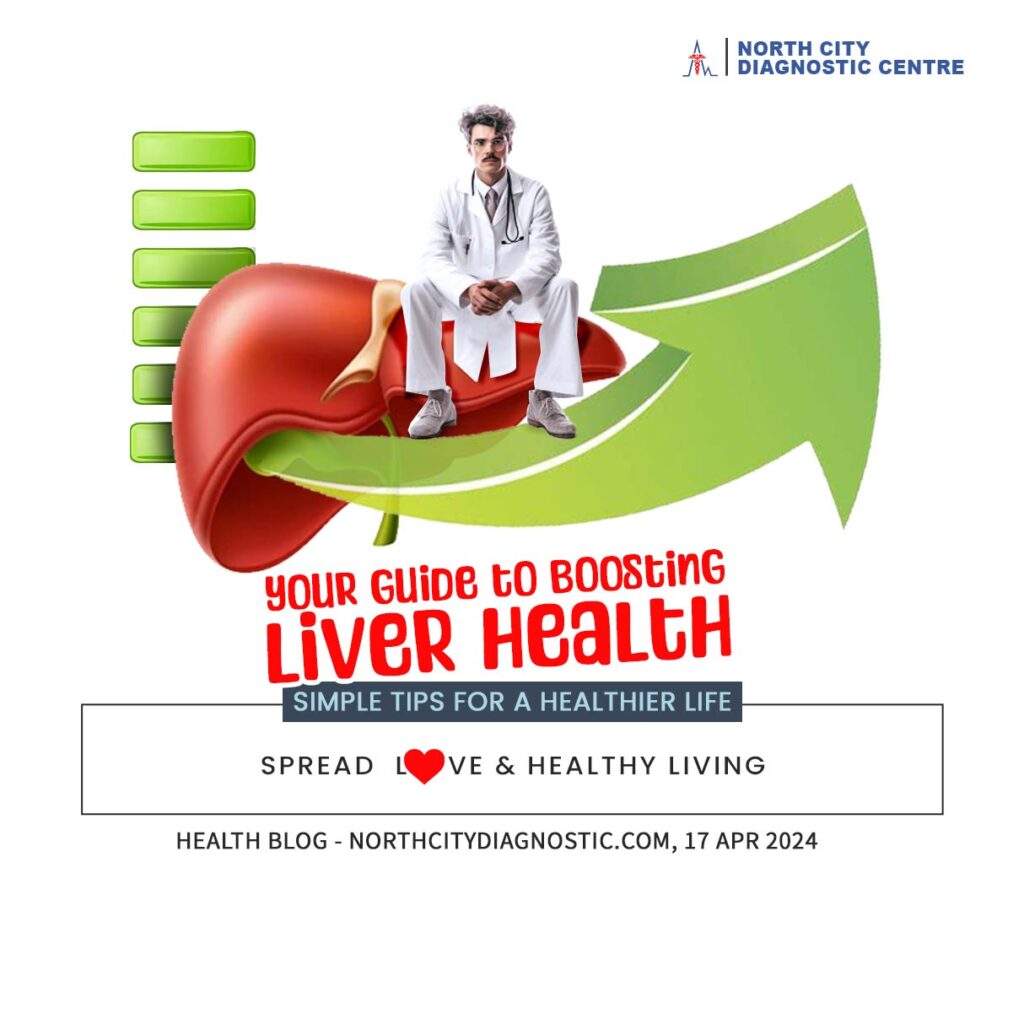
Menu
Your liver plays a vital role in keeping your body healthy and functioning properly. It’s responsible for filtering toxins from your blood, metabolizing nutrients, and aiding in digestion. Taking care of your liver health for overall well-being. Fortunately, there are many simple steps you can take to improve liver health and promote a happier, healthier life

Maintaining a healthy liver requires adopting a range of beneficial habits that support its vital functions and overall well-being.
11 healthy habits are listed below,
Maintain a healthy weight to reduce the risk of developing a fatty liver, which can lead to non-alcoholic fatty liver disease (NAFLD). Weight loss can help reduce liver fat.
Remember to eat a balanced diet, avoiding high-calorie meals, saturated fat, refined carbohydrates, and sugars. Limit red meat and consume low-fat dairy, “good” fats, and plenty of water for hydration.
Exercise regularly. Consistent exercise helps to burn triglycerides for fuel and can reduce liver fat.
Staying hydrated is essential for maintaining optimal health, including the well-being of your liver. Adequate hydration supports the liver’s detoxification process and helps to flush toxins from your system. It also ensures effective bile production for digestion and nutrient absorption.
Toxins can harm liver cells. Limit direct contact with toxins from cleaning and aerosol products, insecticides, chemicals, and additives. When using aerosols, ensure the room is ventilated and wear a mask. Do not smoke.
Alcoholic beverages can damage or destroy liver cells and scar your liver. Consult your doctor about the right amount of alcohol for you. You may be advised to drink alcohol only in moderation or to quit completely.
Remember to avoid contaminated needles and seek medical advice if you experience skin penetration from sharp instruments. Unsafe injection practices, although rare, may occur in a hospital setting and require immediate follow-up. Always use clean needles for tattoos and body piercings.
Unprotected sex or sex with multiple partners increases your risk of hepatitis B and hepatitis C.
Quality sleep and stress management are crucial for liver health. Aim for 7-9 hours of sleep each night to support essential repair processes. Chronic stress can disrupt liver function. Try deep breathing, meditation, yoga, or nature time to lower stress levels and support liver health.
Always follow medication directions, avoid mixing medications or alcohol, and inform your doctor about all the medicines and supplements you use.
Vaccines are available for hepatitis A and hepatitis B. Unfortunately, there’s no vaccine against the hepatitis C virus.
One of the best ways to support liver health is by eating a balanced diet rich in fruits, vegetables, whole grains, and lean proteins. Avoiding processed foods, excessive sugar, and unhealthy fats can help prevent fatty liver disease and other liver-related conditions.
These are packed with antioxidants and fibre, which help reduce inflammation and support liver function. Aim to include a variety of colourful fruits and vegetables in your diet every day.
Some Fruits & Veggies – garlic, green leafy vegetables, turmeric, beetroot, apples, grapefruits, lemon, peppermint, chicory roots, cranberries and blueberries, dandelion roots and milk thistle seeds
Foods like brown rice, quinoa, and whole wheat bread provide complex carbohydrates and fibre, which can help regulate blood sugar levels and prevent fatty liver disease.
Opt for lean sources of protein such as fish, chicken, turkey, tofu, and legumes. Protein is essential for liver repair and regeneration. Red meat like mutton, pork and beef should be avoided.
Include sources of healthy fats such as avocados, nuts, seeds, and olive oil in your diet. These fats help protect against liver damage and promote overall health.
Your liver acts as the main filtration system in your body. It converts toxins into waste products, cleanses your blood, and metabolizes nutrients and medications to produce essential proteins for the body. Because the liver plays a fundamental role in the body’s overall regulation, it’s crucial to maintain its health and avoid overindulgence.
Liver cleanses are often marketed as a cure-all for daily liver health and overindulgence, but North City Diagnostic Centre does not recommend them. While some ingredients have shown positive results, there is not enough data to recommend their routine use. Moderation is the best approach for liver health, and cleanses have not been proven to rid your body of damage from excess consumption.
Many products marketed as liver detoxification aids are also promoted as weight loss cleanses. However, there is no clinical data to support the effectiveness of these cleanses. In fact, some dietary supplements can potentially harm the liver by causing drug-induced injury, so they should be used cautiously.
Contrary to the myth, there are many preventive steps you can take to protect yourself against liver disease.
To prevent liver disease, take these steps:
Liver cleanses have not been proven to treat existing liver damage, but there are many other forms of treatment available for those who are affected.
Here are a few types of liver disease and their available treatment options:
– Hepatitis A and B: Vaccination is recommended, and there are highly effective oral medications for chronic hepatitis B.
– Alcoholic liver disease: Cease all alcohol consumption to allow the liver to recover.
– Hepatitis C: Highly effective oral medications are available for treatment.
– Nonalcoholic fatty liver disease: Weight loss is the most effective treatment to decrease fat in the liver and reduce inflammation.
Obesity significantly increases the risk of developing nonalcoholic fatty liver disease. As mentioned in myth #4, fat in the liver can cause inflammation, which may lead to the development of fibrosis and cirrhosis.
Regular monitoring of liver health is crucial for early detection and prevention of liver-related conditions. Your liver performs numerous vital functions, including detoxification, metabolism, and bile production. Monitoring liver health involves understanding various tests and adopting lifestyle practices to promote optimal liver function. Let’s explore the importance of monitoring liver health and practical steps for maintenance.
Liver function tests (LFTs) are blood tests that assess the health and functionality of the liver. These tests measure the levels of enzymes, proteins, and other substances in the blood that indicate liver function. Common liver function tests include:
Alanine transaminase (ALT) and aspartate transaminase (AST): Elevated levels of ALT and AST may indicate liver damage or inflammation. These enzymes are released into the bloodstream when liver cells are injured.
Alkaline phosphatase (ALP) and gamma-glutamyl transferase (GGT): Elevated levels of ALP and GGT may indicate bile duct obstruction or liver damage. ALP is also found in bones and other tissues, so additional tests may be needed to determine the source of elevation.
Bilirubin: High levels of bilirubin can indicate liver disease or problems with bile ducts. Bilirubin is a yellow pigment produced during the breakdown of red blood cells.
Albumin and total protein: Low levels of albumin and total protein may indicate liver disease or malnutrition. These proteins are produced by the liver and help maintain fluid balance and transport substances in the blood.
Prothrombin time (PT) and international normalized ratio (INR): These tests measure how long it takes for blood to clot. Prolonged PT and elevated INR may indicate liver dysfunction, as the liver produces proteins necessary for blood clotting.
Your liver acts as the main filtration system in your body. It converts toxins into waste products, cleanses your blood, and metabolizes nutrients and medications to produce essential proteins for the body. Because the liver plays a fundamental role in the body’s overall regulation, it’s crucial to maintain its health and avoid overindulgence.
Liver function tests (LFTs) are blood tests that measure different things in your blood, like enzymes, proteins, and bilirubin. These can show if your liver is damaged or not working well. Getting these tests regularly can help find problems even before you feel sick.
Avail specialized health check-up and screening. North City Diagnostic Centre offers state-of-the-art health check-up and screening packages at affordable prices. Call 
It’s especially important for people who drink a lot of alcohol, are obese, have diabetes, have viral hepatitis, or have family members with liver problems to get tested often. Also, if you feel tired a lot, have yellow skin or eyes, have stomach pain, or are losing weight without trying, you should get a liver function test.
Finding problems early with regular testing means you can get treatment early. This can stop the problem from getting worse. For example, if doctors find liver disease early, they can help you change your lifestyle or give you medicine to slow or stop it. If the disease is advanced, finding it early means you can see special doctors who can help you.
Getting tested regularly also helps you take care of your liver. If you understand your test results and talk about them with your doctor, you can make good choices about your lifestyle. For example, you can decide how much alcohol to drink, what to eat, and how much to exercise to keep your liver healthy.
In short, regular testing is very important for your liver. It helps find problems early and get treatment quickly. Doing these tests regularly means you can take control of your health and keep your liver working well.
At North City Diagnostic Center we offer personalized testing schedule that aligns with your medical history and risk factors. Consistent monitoring can be invaluable for early detection and effective management of arthritis. It’s not just about how often you test but making sure that the tests are aligned with your overall health profile for maximum benefit.
#liverhealth #liver #liverdisease #fattyliver #health #liverdetox #livercleanse #detox #healthylifestyle #cirrhosis #fattyliverdisease #nafld #nutrition #healthyeating #guthealth #nash #hepatitis #healthyliver #wellness #nafldwarrior #livertransplant #fattyliverdiet #nafldfoods #nafldfighter #lowsodium #fattyliverjourney #healthyeats #NDC #HealthFirst #DiagnosticServices #NorthCityDiagnosticCentre
35-A ,Canal West Road
Near Gouri Bari Bus Stop
Kolkata – 700004.
Local: +91 33 6605 0888